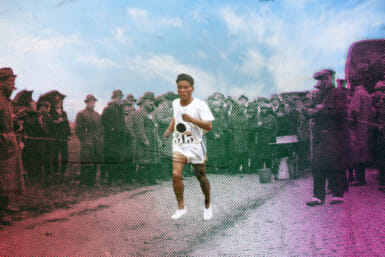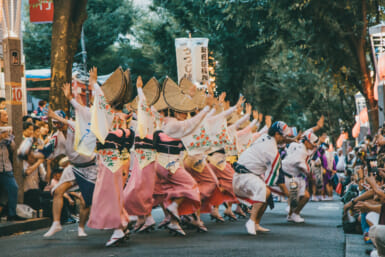by Gabby Seto
“The International Public Hearing Concerning Post-War Compensation of Japan,” organized by a citizens group, including Professor Daizaburo Yui and professor Hiroshi Yoshida of Hitotsubashi University, was held in Tokyo Panse Hall last Dec. 9. The conference addressed various issues of war crimes, including the subject of “comfort women,” or women forced into sexual slavery for the Japanese Imperial Army. Six former “comfort women” from various countries testified how they were abducted, raped and tortured by Japanese soldiers.
Ms. Kang Soon-Ae from South Korea was forcibly taken from her house at the age of 14. Not only was she forced to “accommodate” 35 or more soldiers a day, but also she was beaten so hard that she lost all her teeth from the beatings. “When other women cried out, Japanese soldiers would cut off their nipples with swords,” Soon-Ae testified. Torture with swords and water were common. Many of the women’s uteruses were destroyed so that they could hardly walk, much less bear children.
Ms. Maria Rosa Luna Henson of the Philippines was also only 14 when she was raped by three Japanese soldiers. She described how she was beaten by officers and taken to a house where she was gang-raped by 20 men. “The people need to be told so that nothing like this ever happens again,” she declared.
A North Korean woman, Ms. Kim Yong-Sil, was told that she was going to a factory to work, but was taken, instead, on a truck to a place near the border. After being given a Japanese name, “Eiko,” and a kimono, she was put in a hut where she was raped by seven soldiers, including an officer with three stars on his uniform. From then on, she was forced to have sex with as many as 50 men, especially on Sundays.
The soldiers threatened that they had to speak in Japanese; her friend was beheaded for speaking Korean. One day, when she said she hurt all over, a soldier seized her hair and banged her head against the wall, maiming her arm permanently. She ran away after he unsheathed his sword. However, she was caught and tortured; water was forced into her nostrils and when she was bloated, they put boards on her body. Soldiers jumped up and down on her. Each time she fainted, they poured water on her to awaken her. Yong-Sil asserted, “The Japanese government deceived us and said they would give us jobs. Compensation could never remove my experiences.”
Ms. Wan Ai Hua from northern China was 15 when she was held captive. She is now permanently disabled; a part of her right ear was cut off after she resisted; after she tried to escape, soldiers broke her pelvic bone, shoulder joint and ribs. When Hua attempted to demonstrate how she was raped as three soldiers pinned her to the ground, she fainted.
A Taiwanese woman who chose to remain anonymous stated that she was told she would be a nurse when she was taken away at age 17. Instead, she was forced to become a “comfort woman.”
Ms. Jeanne Ruff-O’Herne, a Dutch woman, suggests the use of the term “Japan war rape victims” instead of the term “comfort women.” She was taken from a prison camp in Indonesia at the age of 21. All single women who were 17 and older were told to line up. After sneering, pointing and touching, the soldiers ordered 10 girls to step forward. They were told to pack, were put on trucks and taken to a house in Semarang. Each girl was given a room. On opening night, all girls were dragged to their rooms. Ruff-O’Herne fought and pleaded in English and Indonesian; curled herself up in a corner. The soldiers then became angry and pointed a sword at her before raping her.
“I can find no words to describe this rape,” she recalls in horror. “To me, it was worse than dying. I ran to the bathroom where I found the other girls trying to wash away the dirtiness. I was dragged from my hiding place and it happened again and again.”
Ruff-O’Herne remembers that when a Japanese doctor visited her, examining the women for diseases, she pleaded for him to help her, whereupon she was brutally raped by the doctor himself.
The above summary of the testimonies by women who were courageous enough to tell the public of their personal experiences is only a part of the story, a tip of the iceberg. But it is a tale that needs to come out, and to be told. The women made a plea for Japan to admit to its war crimes before more victims die. Ms. Kang Soon-Ae emphasized, “Monetary compensation is not the issue. Crimes were committed and need to be addressed.
We need to find out the facts and to acknowledge what we have done. This is the duty that all Japanese citizens face. It may be painful, but we cannot close our eyes to what happened only a few decades ago.
What should be done? This is perhaps the most difficult question of all. It will require a sincere discussion and analysis by all. Here, I shall only introduce a proposal by Ms. Lourdes Indai Sajor, a coordinator for Filipina “comfort women.” She suggests the following: the Japanese government must face up to its responsibility for sexual slavery with a formal apology and adequate compensation for “comfort women” and their families; the issue of these unfortunate women must be included in Japanese textbooks and historical education—as the war crimes they are.








